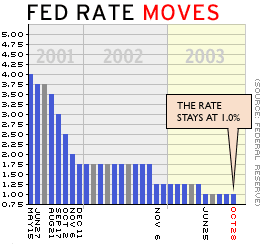NEW YORK (CNN/Money) -
Despite recent signs of gathering strength in the U.S. economy, the Federal Reserve is likely to keep rates low for quite some time, according to recent remarks by several Fed policy makers.
Chairman Alan Greenspan, in prepared remarks delivered to the Securities Industry Association annual meeting in Boca Raton, Fla., last week, hinted the Fed could stay on the sidelines longer than some market participants might expect, despite recent reports of strong third-quarter economic growth and job creation in September and October.

Usually the Fed is quick to raise rates when the economy starts to take off, in an effort to keep a lid on inflation; but inflation is extremely low right now, with core consumer price indices growing at a rate of little more than 1 percent per year lately.
"In these circumstances, monetary policy is able to be more patient," Greenspan said.
At its most recent policy meeting, in late October, the Fed left its key short-term rate at the lowest level in more than 41 years and promised to keep rates low for a "considerable period."
Fed Governor Ben Bernanke, in a separate speech delivered the same day at Carnegie Mellon University in Pittsburgh, echoed Greenspan by saying the Fed had "considerable scope for a continuation of the currently accommodative monetary policy without undue risk to price stability."
On Friday of this week, Philadelphia Fed President Anthony Santomero said that though the Fed would "eventually" need to move to a "less stimulative" and, later, to a "neutral" policy stance, such moves wouldn't happen any time soon.
"In light of significant excess capacity and benign inflation pressures, any policy adjustment need not take place in the near future," Santomero said.
On Thursday, St. Louis Fed President William Poole -- widely considered an inflation "hawk," more inclined to raise rates early to slow the economy and inflation down -- said in an interview the Fed could wait until well after March 2004 before raising interest rates again.
And Chicago Fed President Michael Moskow, speaking Thursday in Vienna, said that, though the economy seemed poised for above-potential growth, the Fed was still more concerned about falling inflation.
"It is appropriate to maintain an accommodative monetary policy stance, in order to provide some insurance against unwelcome disinflation," Moskow, currently a voting member of the Fed's policy-making committee, said.
Typically, at this stage of an economic recovery, interest rates and inflation rise as the economy heats up. But a long period of below-potential growth has left a lot of, as Bernanke calls it, "slack," consisting of unemployed workers and unused production equipment.
Until the economy grows fast enough for long enough, that slack won't be taken up and inflation won't rise, according to many economists.
Greenspan and others have been consistently bullish on the economy's chances of growing above potential for a sustained period, which they believe eventually will push inflation higher.
"The odds ... increasingly favor a revival in job creation," Greenspan said, which wouldn't come a moment too soon for the health of the broader economy.
"Unless hiring picks up and layoffs ease, assuaging the latent job security fears of many of those currently employed, the share of income spent could decline, a development that would hamper the vigor of the expansion," the central bank chairman said.
Greenspan said the economy was able to grow in the third quarter at the fastest pace in nearly 20 years, while adding few jobs, because of "astonishing" gains in productivity, or output per worker hour, which grew at about a 7.5-percent annual rate in the second and third quarters.
But productivity can't keep growing at such rates forever, and businesses may feel the need to rebuild their inventories, which were sapped during the summer's run of strong sales. If they do, and if demand stays strong, then hiring should pick up, Greenspan said.

|

